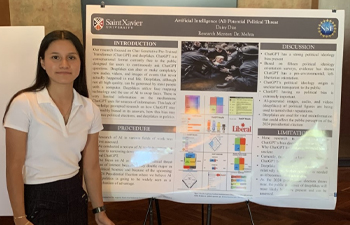
SXU Political Science and Psychology Student Presents at Research Symposium

Saint Xavier University (SXU) student Daisy Diaz recently presented her project, "Artificial Intelligence (AI) Potential Political Threat" at SXU's 2023 EXPLORE STEM Research Fellowship Symposium.
Diaz, who's double-majoring in psychology and political science, was intrigued by the potential impact of AI technologies (such as ChatGPT and deepfakes) on the forthcoming 2024 presidential election.
"My fascination with exploring the political threat of AI was ignited by the significant advancements it has made in the political arena, particularly in recent times. My capstone project centers on diving deeper into AI and its potential political threats. My key areas of focus include analyzing the impact of AI algorithms in social media on polarization and media echo chambers as well as their ramifications on governance and democracy," said Diaz.
Diaz's project focused on the mechanisms ChatGPT (Chat Generative Pre-Trained Transformer) uses for sources of information, and she found that there is very little awareness of the dangers deepfakes can have. She conducted research on how ChatGPT may be biased in its answers, how the bias can influence political elections, and the use of deepfakes in the political sphere.
"To determine whether ChatGPT continues to have a political bias despite its numerous updates, we tested the validity in some of David Rozado's January 2023 political ideology tests administered to ChatGPT. We found very few discrepancies between the results Rozado obtained and the ones we ran, suggesting ChatGPT continues to have political bias," said Diaz.
Diaz found that working on the project helped her to improve her research and writing skills, and she is grateful for her mentors.
"My mentor, Dr. Jean Mehta, provided valuable support throughout the research process and helped me develop my capabilities. She also encouraged me to delve into a topic that I am particularly passionate about. I am also grateful for Colleen Hanrahan and Marina Martinez, who provided me with invaluable support and were always available to offer their assistance," said Diaz.
Diaz was inspired to pursue studies in political science because of her deep-rooted passion for politics, which was sparked by her older brother, Daniel, who serves as a senior paralegal in a prominent law firm. Her fascination with psychology was ignited by her other brother, Jose, whose kind and compassionate nature left a lasting impact on her.
"Driven by my innate desire to create a positive impact on people's lives, I developed an intense passion for psychology. As a first-generation student, my older brothers served as my role models who instilled in me the belief that I could achieve anything I set my mind to. Both of my majors help me to take a crucial step toward achieving my goals, as they provide me with a deeper understanding of different groups of people and the tools necessary to help them," said Diaz.
In her years at SXU, Diaz has been drawn to the warm and supportive environment fostered by the students, faculty and staff and feels that SXU's unwavering commitment to student success motivates her to excel academically and achieve her goals.
"My classes push me to be academically capable and tenacious and provide me with the support to confidently ask for additional help if I am struggling," said Diaz.
Diaz is a member of the Honors Program and treasurer of the Psychology Club. In addition to her symposium research, she also had the opportunity to intern at the Center for Community Research at DePaul University over the summer. Previously, she presented a poster titled "Student-Athlete Success Outcomes" with Dr. Bobak at the Midwestern Psychological Association (MPA) conference in April.
In the spring, Diaz will present her honors capstone and a poster at the 2024 MPA conference. She also plans to pursue internships that align with her majors, one of which will be in a clinical setting. Her ultimate goal is to secure a doctorate in clinical-community psychology and advance research efforts, with a particular focus on diverse communities.
This research program was supported by a grant from the National Science Foundation (No. 1832511).

